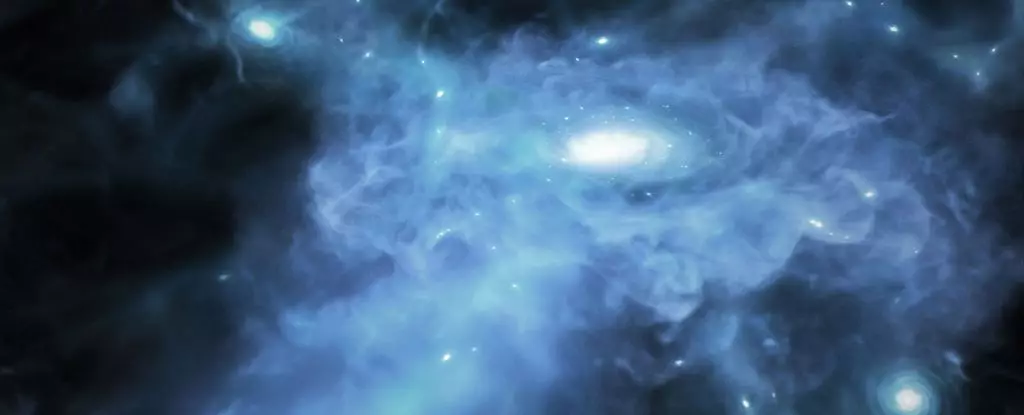

In a groundbreaking discovery, scientists have delved into the turbulent era of the Cosmic Dawn to unveil the formation processes of some of the Universe’s earliest galaxies. Recent observations from the James Webb Space Telescope (JWST) have provided insights into the birth of galaxies around 13.3 to 13.4 billion years ago, just a few hundred million years after the Big Bang. These observations have revealed the active slurping of gas reservoirs into three newly forming and growing galaxies, marking a significant milestone in our understanding of galaxy formation.
The Cosmic Dawn, which encompasses the first billion or so years after the Big Bang, has long been shrouded in mystery and the fog of neutral hydrogen that pervaded the Universe. This fog hindered the propagation of light and obscured our view of the early Universe. However, the JWST was designed to penetrate this fog by using infrared wavelengths that can travel through it more effectively than other wavelengths. Scientists are keen to understand how the first stars and galaxies emerged from the primordial soup and how the Universe transitioned to its current state.
Led by astrophysicist Kasper Elm Heintz, an international team used JWST’s infrared capabilities to detect signals emanating from three galaxies that existed around 400 to 600 million years after the Big Bang. These galaxies, identified as some of the earliest detected, appeared as luminous islands amidst a sea of neutral gas. The researchers were able to distinguish the large gas reservoirs surrounding the galaxies, indicating active galactic material formation. The abundance of gas suggested that the galaxies had not yet formed most of their stars, shedding light on the initial stages of galaxy evolution.
Although significant progress has been made in uncovering the secrets of the Cosmic Dawn, many questions remain unanswered. The discovery of these early galaxies represents a crucial step towards understanding the galaxy formation process. As cosmologist Darach Watson points out, the observations provide a glimpse into the moment when the first stars and galaxies began to coalesce from the cosmic haze. With further exploration and analysis, scientists hope to unravel more mysteries surrounding the origins of the Universe.
The study of the Cosmic Dawn not only enriches our understanding of the Universe’s history but also raises profound questions about our own origins. Astronomer Gabriel Brammer emphasizes the significance of these discoveries in piecing together the puzzle of our cosmic ancestry. By shedding light on the formation of the Universe’s first structures, researchers are taking crucial steps towards unraveling the mysteries of our cosmic origins and evolution. As we continue to explore the depths of space and time, the revelations from the Cosmic Dawn promise to inspire new breakthroughs in astrophysics and cosmology.
In the realm of software development, the ability to swiftly and accurately address bugs is…
The realm of quantum computing and communication is not just an abstract dream anymore; it…
In a remarkable leap for the field of material science, a collaborative research initiative has…
Throughout Earth's vast history, our planet has endured five major mass extinction events that reshaped…
Rainfall is a vital element of our planet’s hydrological cycle, yet many aspects of its…
On a night when the universe aligns, a mesmerizing phenomenon awaits: the appearance of the…
This website uses cookies.